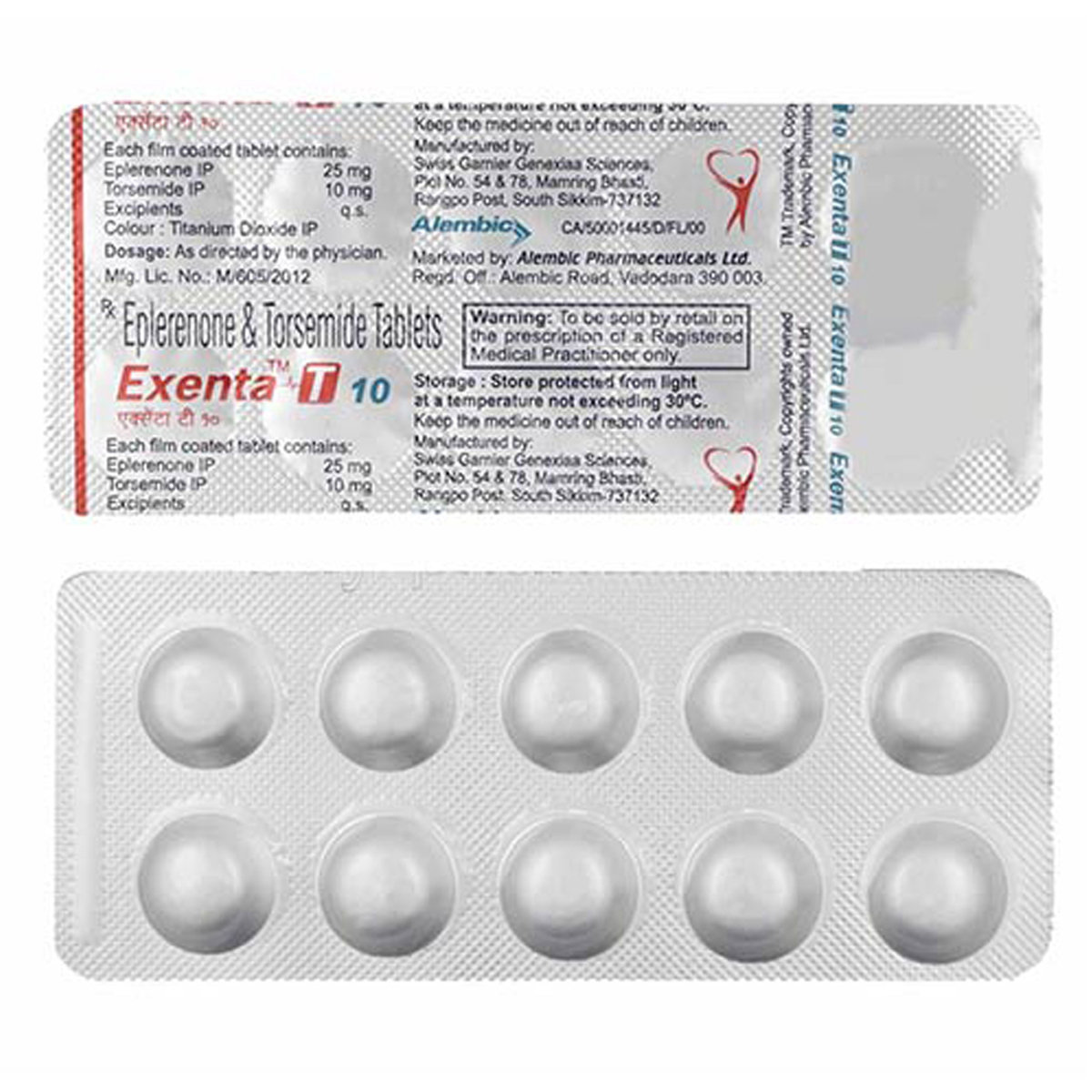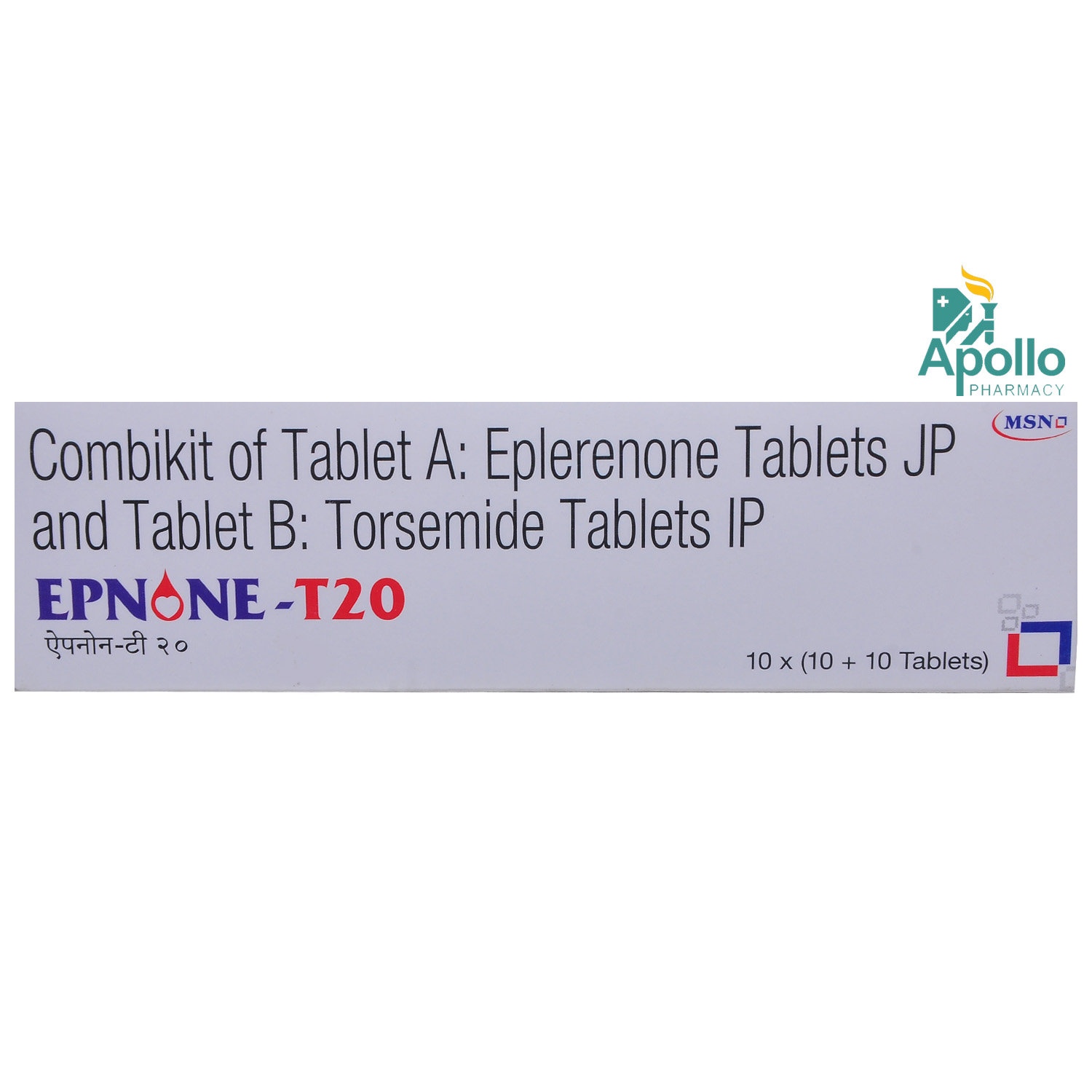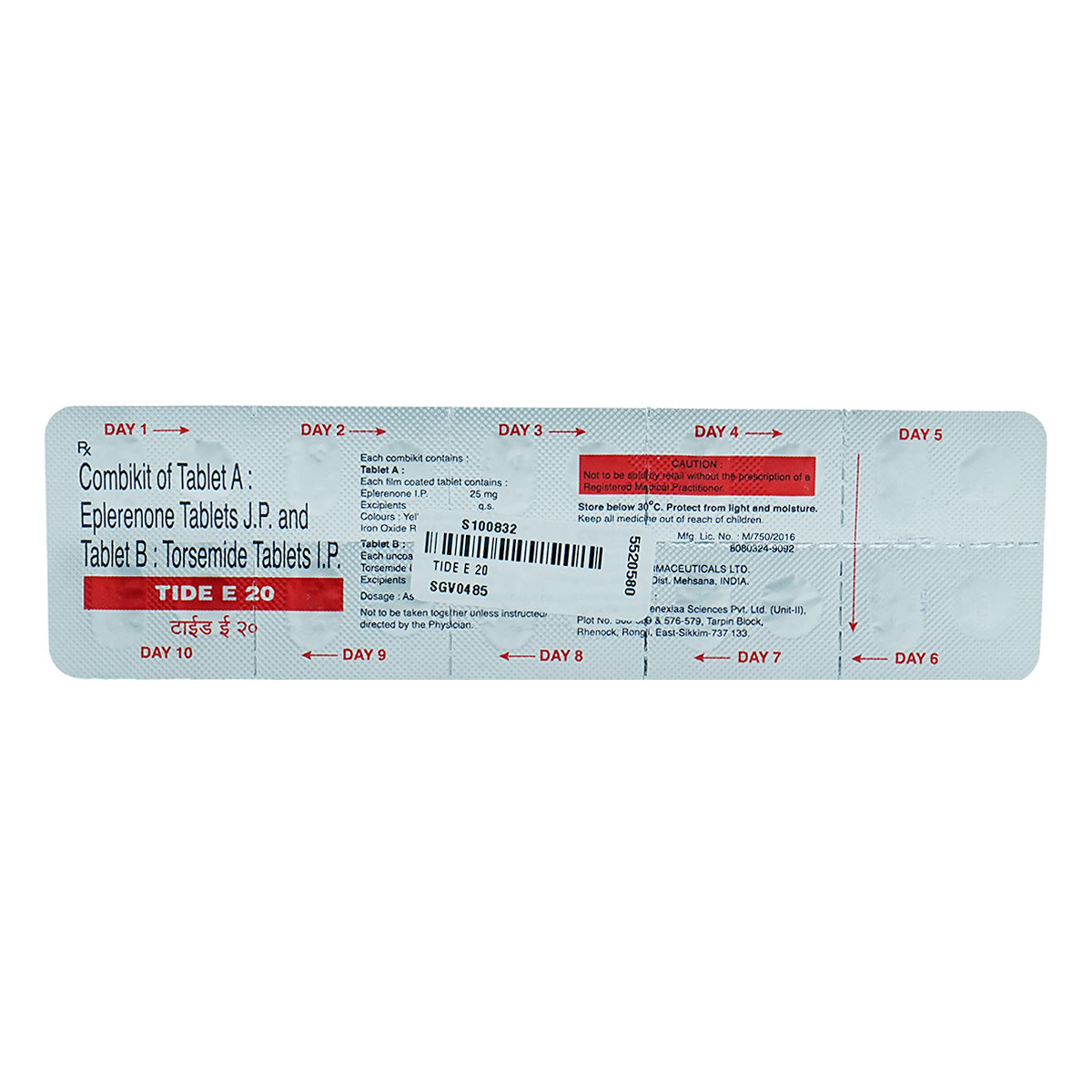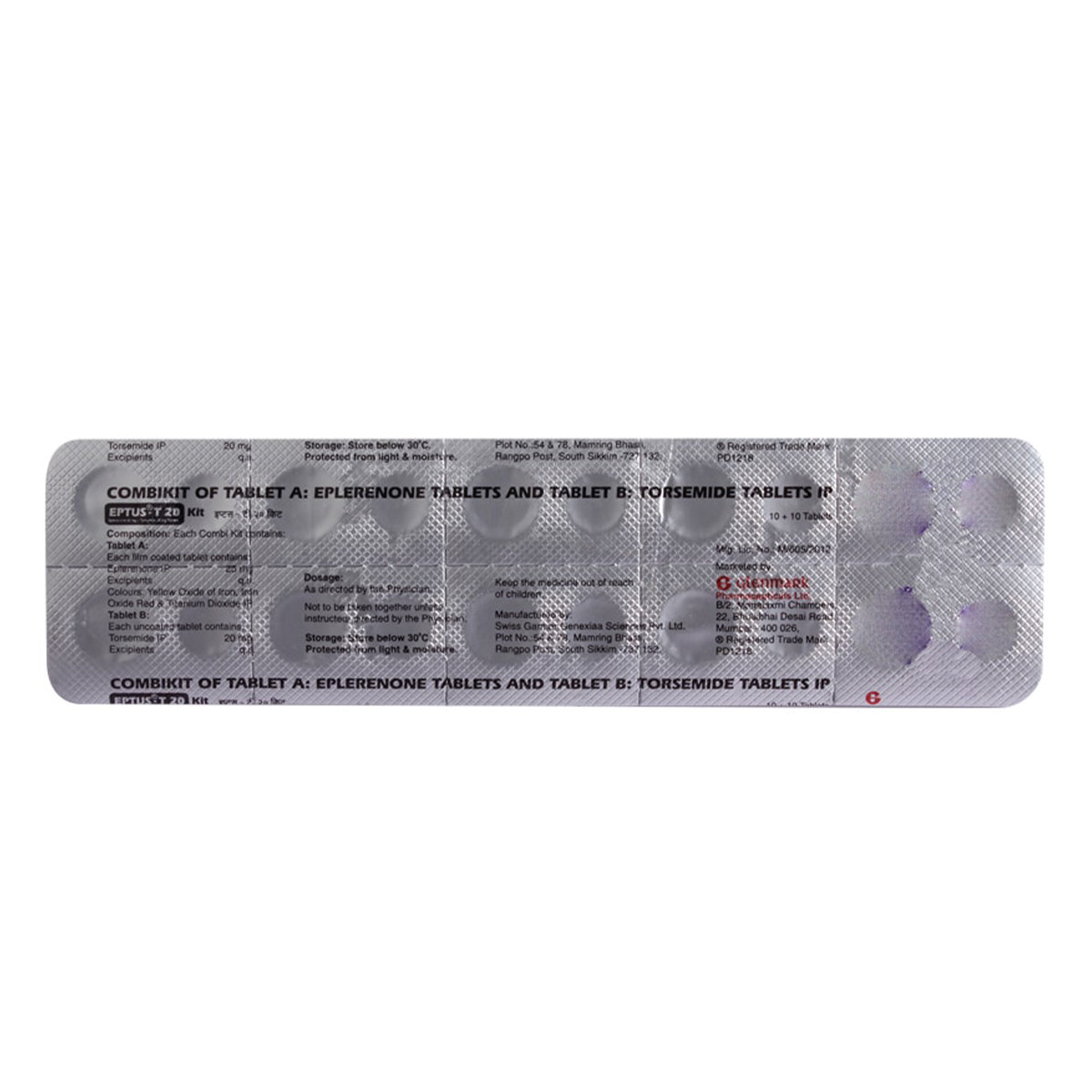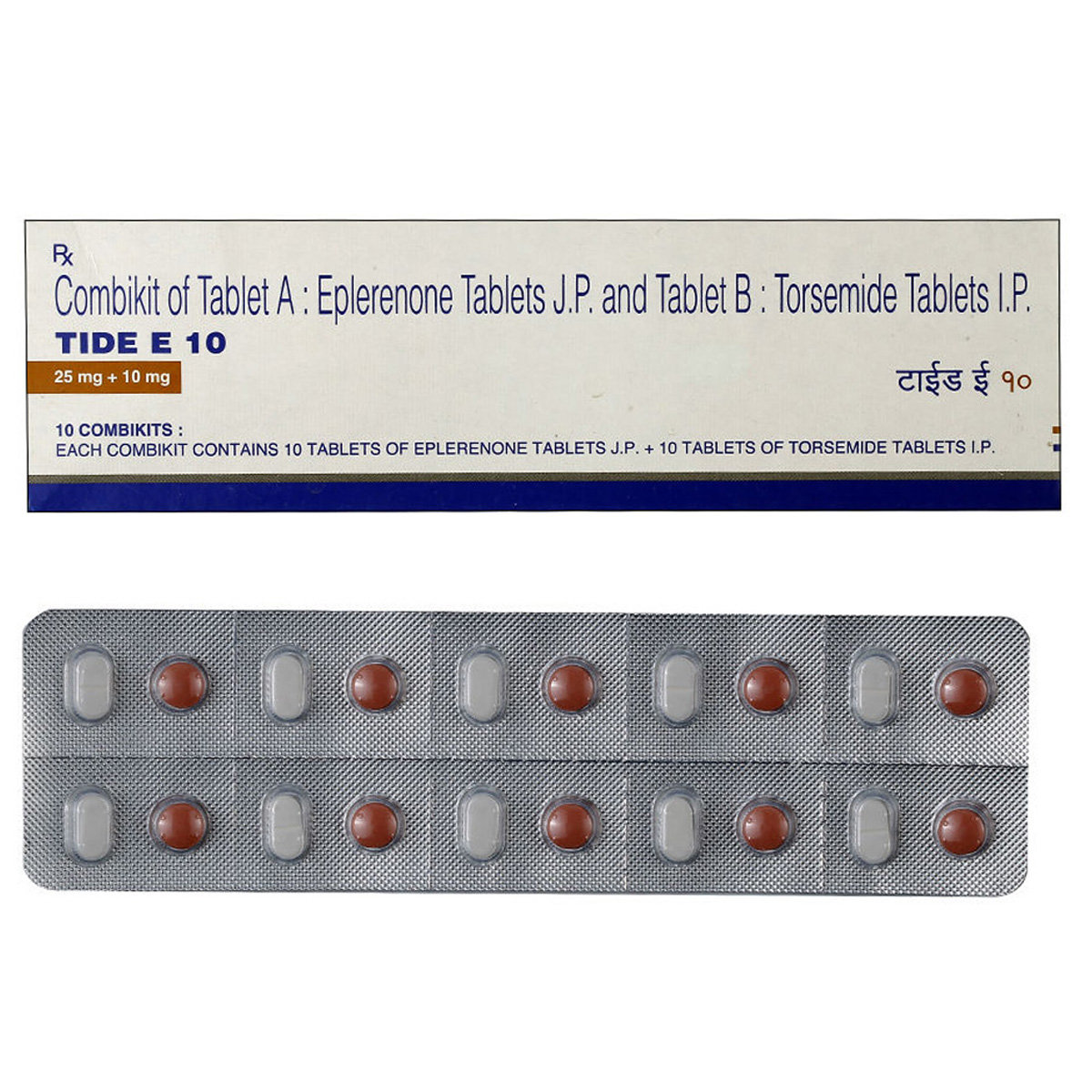Eplerenone+torasemide
About Eplerenone+torasemide
Eplerenone+torasemide is used to treat congestive heart failure post-heart attack. Additionally, it is also used to treat oedema (fluid build-up) and hypertension (high blood pressure). High blood pressure is a condition in which the force of blood against the walls of blood vessels is too high.
Eplerenone+torasemide contains Eplerenone and Torasemide, which work by removing excess water and certain electrolytes from the body. It also helps maintain potassium levels. Thus, Eplerenone+torasemide lowers blood pressure and improves heart function.
In some cases, Eplerenone+torasemide may cause side effects like headache, dizziness, diarrhoea, constipation, nausea, and excessive urination. Most of these side effects do not require medical attention and resolve on their own. However, consult your doctor if the side effects persist or worsen.
Do not take Eplerenone+torasemide if you are pregnant or breastfeeding. Consult your doctor if you are pregnant or breastfeeding. Keep your doctor informed about any other medications you are taking and your medical conditions.
Uses of Eplerenone+torasemide
Medicinal Benefits
- Eplerenone+torasemide helps improve survival in patients with congestive heart failure (CHF) following a myocardial infarction (heart attack).
- It aids in the management of hypertension (high blood pressure) by removing excess fluid and relaxing blood vessels.
- It reduces oedema (fluid retention) associated with heart failure, liver cirrhosis, or pulmonary hypertension.
- Eplerenone helps maintain normal potassium levels in the blood while controlling blood pressure.
- Torasemide promotes the removal of excess salt and water from the body, reducing swelling.
- It helps prevent fluid buildup in the lungs and tissues, improving breathing and comfort.
- Eplerenone+torasemide reduces strain on the heart, improving its overall function and efficiency.
- It enhances the quality of life and reduces complications related to fluid overload and high blood pressure.
Directions for Use
- Eplerenone+torasemide can be taken with or without food as advised by a doctor.
- It should be taken at the same time of the day each time for the best results.
- Swallow it as a whole with a glass of water.
- Do not crush, chew, or break it.
Storage
Side Effects of Eplerenone+torasemide
- Headache
- Dizziness
- Diarrhoea
- Constipation
- Nausea
- Excessive urination
Drug Warnings
- Do not take Eplerenone+torasemide if you are allergic to any of its components.
- Inform your doctor if you have anuria (lack of urine production), low blood pressure, hepatic coma and precoma, hypovolaemia (low blood volume), diabetes, and heart, kidney or liver problems.
- Consult your doctor if you are pregnant or breastfeeding.
- Eplerenone+torasemide is not recommended for use in children.
- Drive only if you are alert, as Eplerenone+torasemide may cause dizziness and sleepiness.
- Let your doctor know if you are taking any other medicines, including supplements and herbal products.
Drug Interactions
Drug-Drug Interactions: Eplerenone+torasemide may interact with other high blood pressure-lowering pills (metoprolol, ramipril, hydrochlorothiazide, rosuvastatin, atorvastatin), blood thinners (aspirin, warfarin), anti-epilepsy medications (carbamazepine, phenobarbital), immune-suppressing drugs (cyclosporine), painkillers (ibuprofen), antifungals (ketaconazole, itraconazole), HIV protease inhibitors (nelfinavir, ritonavir).
Drug-Food Interactions: No interactions found.
Drug-Disease Interactions: Eplerenone+torasemide may interact with disease conditions, including cardiogenic shock (when the heart fails to pump required blood to the body), heart valve problems (stenosis), low blood pressure (hypotension), coronary heart disease, liver disease, or heart failure, low serum potassium (hypokalemia) and patients with nil urine output (anuria).
Drug-Drug Interactions Checker List:
Safety Advice

Alcohol
cautionYou are recommended not to consume alcohol along with Eplerenone+torasemide to avoid unpleasant side effects.

Pregnancy
cautionInform your doctor if you are pregnant or suspect pregnancy. Your doctor will weigh the benefits and potential risks before prescribing Eplerenone+torasemide.

Breast Feeding
cautionIt is not known if Eplerenone+torasemide passes into breastmilk. So, inform your doctor if you are a nursing mother. Your doctor will weigh the benefits and potential risks before prescribing Eplerenone+torasemide.

Driving
cautionEplerenone+torasemide may cause dizziness and sleepiness. Drive only if you are alert.

Liver
cautionEplerenone+torasemide to be taken with caution, especially if you have a history of Liver diseases/conditions. Your doctor may adjust your dose depending on your current kidney conditions.

Kidney
cautionEplerenone+torasemide to be taken with caution, especially if you have a history of Kidney diseases. Your doctor may adjust your dose depending on your current kidney conditions.

Children
unsafeEplerenone+torasemide is not recommended for children below 12 years of age.
Habit Forming
Diet & Lifestyle Advise
- Consume antioxidant-rich foods such as blueberries, cherries, tomatoes, squash, and bell peppers.
- Eat natural diuretic foods like asparagus, beets, green beans, grapes, onion, leafy greens, pineapple, leeks, pumpkin, and garlic.
- Use healthy cooking oils like soybean, olive, canola, and coconut oil.
- You should avoid refined foods such as white bread, spaghetti, sugar, and red meat.
- Reduce or eliminate trans fatty acids, which are found in commercially baked goods such as cookies, cakes, crackers, French fries, onion rings, and doughnuts, as well as in processed foods.
- Avoid consuming too much salt or salty foods.
- Keep your weight under control with a BMI of 19.5-24.9.
- Regular physical activity, such as walking, improves blood flow.
- When possible, elevate your legs or the swollen area on a chair or a stack of pillows.
- Avoid standing or sitting for extended periods of time.
- Avoid chronic stress, as it can raise your blood pressure.
- Spend time with your loved ones to cope with stress and practice mindfulness techniques.
- Quitting smoking and alcohol consumption is the best strategy to lower the risk of many health complications.
Special Advise
- Treatment with Eplerenone+torasemide requires regular monitoring of serum potassium, sodium and creatinine levels.
- Monitor your blood pressure daily, and if there is too much fluctuation, immediately contact your doctor.
Patients Concern
Disease/Condition Glossary
Heart failure: Heart failure is a condition in which the heart is unable to pump blood as effectively as it should. Conditions such as coronary artery disease, arrhythmia, congenital heart defect, diabetes, overactive/underactive thyroid, or high blood pressure make the heart too weak to pump blood efficiently. Symptoms of heart failure include shortness of breath, rapid heartbeat, swollen legs, and fatigue. People with disease conditions such as diabetes, thyroid problems, anaemia, emphysema, and behavioural conditions like smoking and being overweight are at an increased risk of developing heart failure.
Oedema: Oedema or fluid overload is associated with pulmonary hypertension (high blood pressure in the lungs) or heart failure (irregular pumping of the heart). The main characteristics of oedema are leg swelling, shortness of breath, chest pain (angina), abnormal heart rhythms (arrhythmia) and swelling in other areas of the hands or abdomen.
High blood pressure (hypertension): It is a condition in which the blood exerts increased pressure on the walls of blood vessels, leading to hypertension. This condition can lead to hardened arteries (blood vessels), decreasing the blood and oxygen flow to the heart. Raised blood pressure can cause chest pain (angina) and a heart attack (when the blood supply to the heart is blocked). Additionally, high blood pressure also causes brain damage (stroke) and kidney failure. Symptoms of high blood pressure include headache, dizziness, nose bleed, changes in vision, chest pain, weakness and dyspnoea (shortness of breath). However, most of the time, there are no signs or symptoms of hypertension.
FAQs
Eplerenone+torasemide is used to treat heart failure after a heart attack, high blood pressure, and oedema (fluid build-up).
Eplerenone+torasemide contains Eplerenone and Torasemide. Eplerenone blocks the hormone aldosterone, preventing fluid retention and maintaining potassium levels. Torasemide removes excess water and salt from the body, reducing swelling and fluid overload. Together, they improve heart function, reduce oedema, and help control blood pressure.
Yes, Eplerenone+torasemide may cause excessive urination. Most people need to pee about 30 minutes after taking Eplerenone+torasemide and again within a few hours. Do not take Eplerenone+torasemide before going to bed, or you may have to wake up at night to go for urination frequently.
Yes, Eplerenone+torasemide is known to cause dehydration (excessive fluid loss). The patient may experience dry mouth, decreased urine output, excessive thirst, and hypotension (decreased blood pressure). Please increase fluid intake to avoid severe dehydration.
Yes, Eplerenone+torasemide can cause increased potassium levels (hyperkalemia), especially in patients with kidney problems or when taken with potassium supplements. Please monitor your electrolyte level regularly to avoid increased blood potassium levels.
Yes, Eplerenone+torasemide may occasionally cause dizziness due to orthostatic hypotension (sudden drop in blood pressure when standing from a lying position) or passing out. To lower the chance of feeling dizzy or passing out, rise slowly if you have been sitting or lying down.
Swallow Eplerenone+torasemide whole with water; do not crush or chew it.
Eplerenone+torasemide should be taken with caution, only if prescribed by a doctor, and only if you have kidney or liver disease. Please consult the doctor if you have any concerns.
Eplerenone+torasemide may cause side effects like headache, dizziness, diarrhoea, constipation, nausea, and excessive urination. Most of these side effects do not require medical attention and resolve over time. However, consult your doctor if the side effects persist or worsen.
Treatment with Eplerenone+torasemide requires regular monitoring of serum potassium, sodium and creatinine levels. Monitor your blood pressure daily, and if there is excessive fluctuation, contact your doctor immediately. Regular monitoring of uric acid in patients with gouty arthritis.
Other medications can be taken with Eplerenone+torasemide only if advised by the doctor. Please consult the doctor before taking any other medicines with Eplerenone+torasemide to avoid interactions.


